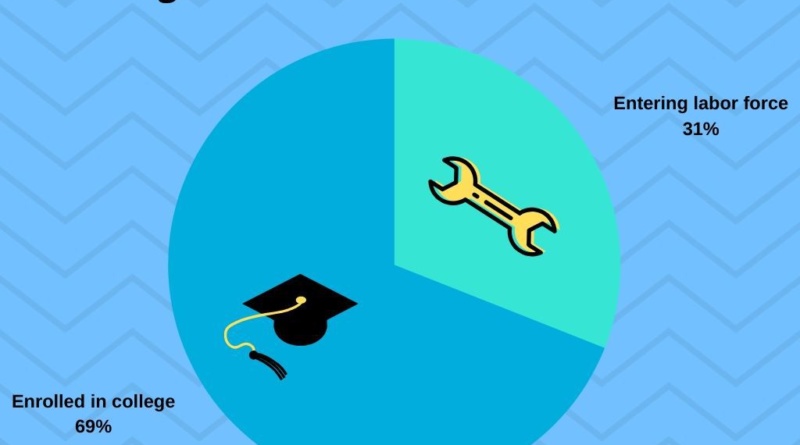OPINION: Should more vocational classes be offered at Davis High?
GRAPHIC: In 2018, 31 percent of high school graduates entered the labor force (Source: Bureau of Labor Statistics).
Davis High needs more vocational classes

By Lucas Tillman,
BlueDevilHUB Staff-
While junior high schools in Davis support and teach shop classes on campus, Davis High fails to provide students with an opportunity to pursue their interests in shop. By bringing shop classes to DHS, students are given the opportunity to further their education outside a traditional classroom environment.
According to the Bureau of Labor Statistics, only 69 percent of 2018 highschool graduates were enrolled in college. This means a large portion of highschool graduates are attempting to enter the labor force without a college education. Having experience in a vocational classroom and possibly earning a diploma from that class will significantly help highschool graduates find their first job.
Many graduates will not be using the Pythagorean theorem or writing analytical essays on Hamlet. While these skills may be useful, learning how to build furniture, change a tire or fix your sink are skills that not only apply to your everyday life but can also save money.
While the push for students to excel in math and science at DHS is important, manual workers continue to be a vital part of our society. We could not function without plumbers, electricians, mechanics and other similar workers.
It is up to DHS administration and our community to further secure our future by not only supporting traditional classrooms, but by adding vocational classes for students.

Davis High does not need additional vocational classes

By Theo Seng,
Davis High student-
Adding vocational courses, while an admirable goal, is not the right decision for Davis High.
While vocational courses introduce alternatives to higher education, Davis is a very academic community, and many students want to go to top colleges.
Vocational courses tend to be expensive, and devoting funding to them takes away from core subjects like mathematics and other sciences.
Learning narrow technical skills in vocational classes, rather than the fundamental and widely applicable ones found in core courses, fails to prepare students for the constantly shifting nature of the workforce or the ideas essential in college.



